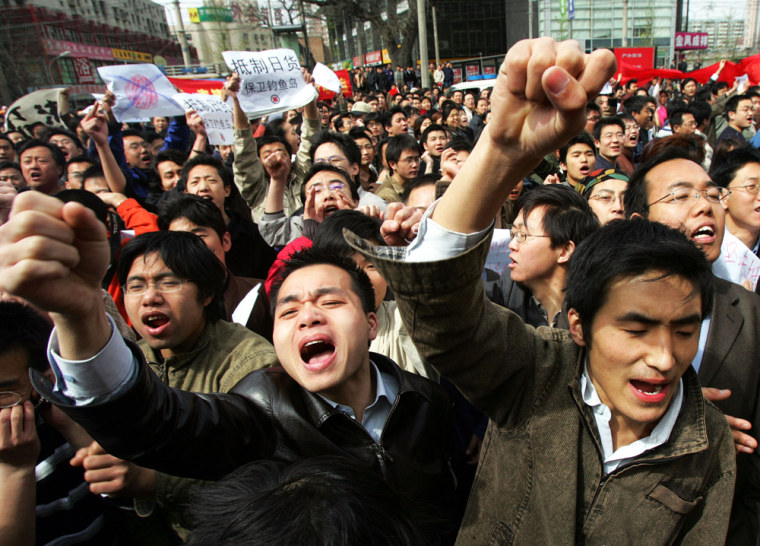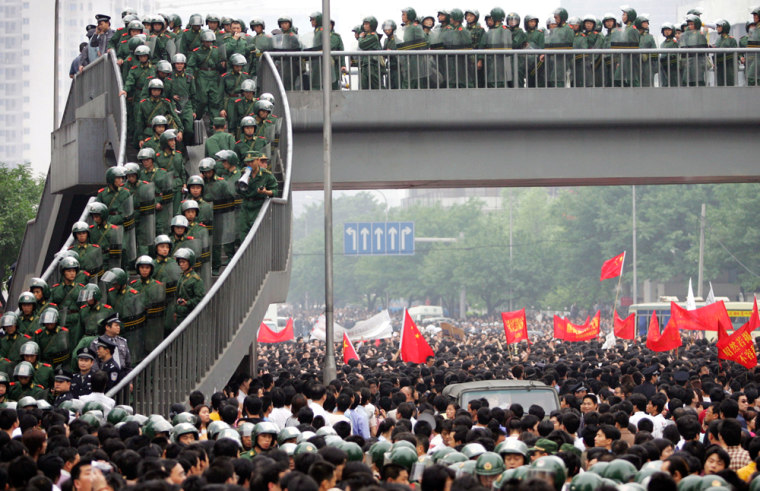China called on Japan on Monday to do more to repair soured relations between the Asian powers, as a government wary of popular protest kept riot police on guard after violent anti-Japanese demonstrations at the weekend.
Thousands took to the streets in Beijing, Chengdu, Guangzhou and Shenzhen at the weekend in an eruption of anger at what many Chinese see as Tokyo's whitewashing of World War Two atrocities and its bid for a permanent seat on the U.N. Security Council.
"Japan must adopt an earnest attitude and appropriate ways to deal with major principled issues concerning the feelings of the Chinese people," the official Xinhua news agency quoted Foreign Ministry spokesman Qin Gang as saying.
"The Japanese have to do more things conducive to enhancing mutual trust and maintaining the relations between the two countries, rather than doing the reverse," he said.

But despite apparent support for what was the biggest outpouring against foreigners since the 1999 NATO bombing of China's embassy in Belgrade, analysts said the government was likely to keep a close eye on future demonstrations.
Concerned about stability and its own grip on power, the Communist leadership would be watching to see that the demonstrations did not turn into a platform to express domestic discontent, they said.
"With nationalism in China, people always attempt to hijack the agenda. It's the most potent sort of release of emotions," said David Kelly, senior research fellow at Singapore's East Asia Institute.
On Saturday night, a crowd of about 1,000 protesters was barred from marching to the political heart of Beijing, Tiananmen Square, where a pro-democracy student protest was crushed with huge loss of life in 1989.
Protests against Japan have in the past been carefully controlled and involved only about 50 people, but on Saturday, an estimated 10,000 people gathered at Japan's embassy and the ambassador's residence, throwing rocks and bottles. They also targeted Japanese businesses, breaking windows of Japanese restaurants.
Pressure valve
Kelly said the government could be allowing the public to let off steam against an external target, but others said the danger of anti-Japanese sentiment spiralling out of control was real.
"If this happens in too many locations simultaneously you have all the potential for a national wave of protests that could easily spill over into other issues," said Willem van Kemenade, a Beijing-based expert on Sino-Japanese relations.
On Sunday, the Foreign Ministry's Qin appealed to protesters to be "calm and sane" and "not to engage in excessive action", reflecting the government's traditional concern for stability.
Some analysts said the government's capacity for control should not be underestimated.
"Anti-Japanese civil groups are under the watchful eye of state security, so there is not much risk of it spiralling out of control," said one Asian diplomat.
But if the government does move to stop more protests, it will come up against public anti-Japanese sentiment exacerbated since Japan's approval of a school textbook last week that critics say glosses over atrocities committed during Japan's 1931-1945 occupation of China.
"I've heard students who are not particularly politically active express very deep-seated hatred of Japan," said a professor at Peking University who did not want to be named.
"The feelings are so strong, I'm not sure there's an awful lot the government can do to intervene without damaging its own credibility," he said.
